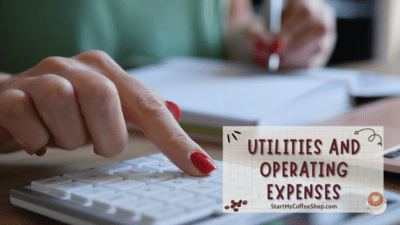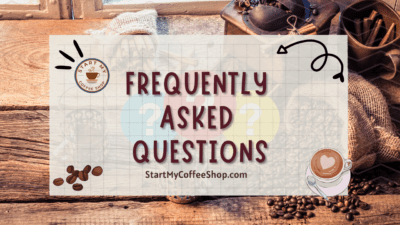Starting a coffee shop can be a dream come true for many entrepreneurs. The aroma of freshly brewed coffee, the cozy ambiance, and the opportunity to create a community gathering spot are all enticing factors. However, before diving headfirst into this venture, it’s crucial to understand the financial aspect of it.
Estimates suggest that the initial investment can range from $80,000 to $300,000 or more, depending on various factors. Conducting thorough research, creating a detailed business plan, and consulting with industry experts will help you arrive at a more accurate estimate for your specific circumstances.
In this article, I will explore the costs associated with a coffee shop business plan, helping you count the beans and make informed decisions.
Location
The location of a coffee shop plays a vital role in determining the cost of the business plan. The cost of commercial real estate can vary significantly based on the city, neighborhood, and even the specific street. Prime locations in bustling city centers or popular tourist destinations tend to come with a higher price tag due to their high demand and visibility. These locations offer the advantage of a built-in customer base and heavy foot traffic, which can contribute to increased sales and brand exposure.
On the other hand, opting for a quieter area with lower rental costs can have trade-offs. While the reduced rent may seem appealing from a cost perspective, it’s important to consider the potential impact on foot traffic and visibility. The improvement of a coffee shop heavily relies on attracting and retaining customers and being situated in a less frequented area may pose challenges in generating sufficient customer flow.

When selecting a location, it’s essential to consider the target market, competitors in the area, and the overall ambiance you wish to create. Conducting thorough market research and analysis will help identify the ideal location that strikes a balance between cost and potential profitability. Factors such as proximity to offices, residential areas, educational institutions, or shopping centers can significantly influence foot traffic and customer base.
Furthermore, leasing terms and conditions can also affect the overall cost. Negotiating favorable lease terms, such as rent escalation clauses, lease duration, and tenant improvement allowances, can help manage costs in the long run. It’s crucial to carefully evaluate the lease agreement, seek legal advice if necessary, and ensure that it aligns with your business objectives and financial capabilities.
While the location of a coffee shop impacts its cost, it is also a critical factor in determining its potential effectiveness. Balancing the expenses associated with prime locations against the benefits of increased foot traffic and visibility is crucial. Conducting thorough market research and negotiating favorable lease terms can help balance costs and the potential for a thriving coffee shop business.
Read more about: Coffee Cart Start-up Costs: Sipping the Numbers
Renovations and Equipment
Creating a captivating and functional coffee shop involves renovating a space and equipping it with the necessary tools. Renovation costs can encompass a wide range of aspects, including interior design, flooring, painting, lighting, plumbing, and electrical work. These components are crucial in crafting an inviting atmosphere that aligns with the coffee shop’s brand and customer experience.
Interior design plays a pivotal role in establishing the ambiance and character of the coffee shop. Factors such as the color scheme, layout, furniture selection, and overall aesthetic contribute to creating a welcoming and comfortable space. Collaborating with a professional interior designer or architect can ensure that the design elements are harmonious and appealing to customers.
The flooring choice is a visual consideration and affects practicality and durability. Options like hardwood, tile, or stained concrete can withstand heavy foot traffic and are easier to clean, ensuring a hygienic environment. The painting of walls and ceilings should be chosen carefully to complement the overall design scheme while reflecting the coffee shop’s identity and brand image.
Proper lighting is essential in creating an inviting ambiance and highlighting key areas such as the counter, seating, and display cases. A combination of natural, ambient, and task lighting can be strategically utilized to create the desired atmosphere. Incorporating energy-efficient lighting solutions can also help reduce long-term operational costs.
A coffee business needs both plumbing and electrical work to run properly. Installing water lines for sinks, espresso makers, and other appliances is part of this. It also entails making sure that there is enough electrical power for the coffee makers, refrigerators, lighting, and other electrical appliances.
It will cost a lot of money to outfit the coffee shop with equipment and machinery of a commercial caliber. This comprises furnishings, refrigerators, display cabinets, espresso makers, grinders, and coffee equipment of the highest caliber. Maintaining constant product quality and operational effectiveness requires investing in sturdy, dependable equipment.
Licenses and Permits
Operating a coffee shop requires adhering to local regulations and obtaining the necessary licenses and permits. These legal requirements ensure that your business meets health and safety standards and operates within the parameters set by the local government. The costs associated with these licenses and permits can vary depending on your location and the specific requirements.
Health permits are typically necessary to demonstrate that your coffee shop meets the hygiene and sanitation standards set by health departments. These permits may require periodic inspections and renewals, with associated fees. Ensuring compliance with health regulations is crucial to protect the health and well-being of your customers and maintain a positive reputation.
Food service licenses are essential if you plan to prepare and serve food in your coffee shop. These licenses ensure that you follow proper food handling, storage, and preparation procedures. The costs of food service licenses can vary depending on factors such as the size of your establishment and the complexity of your menu offerings.
Occupancy permits are required to ensure that your coffee shop meets the local building and fire safety codes. These permits typically involve inspections to assess factors such as adequate exits, fire suppression systems, and adherence to zoning regulations. The cost of occupancy permits may vary depending on the size and occupancy capacity of your coffee shop.
If you plan to serve alcoholic beverages in your coffee shop, you will need to obtain a liquor license. The costs and requirements for liquor licenses vary significantly depending on your location and local regulations. It’s important to thoroughly research the specific laws and regulations governing the sale and service of alcohol in your area.
Failure to obtain the necessary licenses and permits can result in fines, closure of your business, or legal consequences. It’s crucial to familiarize yourself with the local licensing requirements, complete the necessary applications accurately, and budget for the associated costs. Consulting with local authorities or engaging legal assistance can provide guidance and ensure that you meet all the necessary legal obligations.
Staffing and Training

Creating a great coffee shop requires a well-trained and dedicated team that can deliver exceptional service. The cost of staffing encompasses various factors, including wages, payroll taxes, and potential employee benefits.
Wages make up a significant portion of the staffing cost. Determining competitive and fair wages for your staff members is essential to attract and retain talented individuals. The specific wages will depend on factors such as the local labor market, the skill level required, and the responsibilities assigned to each position within your coffee shop.
In addition to wages, employers are responsible for payroll taxes, which include Social Security, Medicare, and unemployment insurance. These taxes are typically calculated as a percentage of the employee’s wages and vary depending on local laws and regulations.
Providing employee benefits can be an additional cost but can contribute to staff loyalty and job satisfaction. Offering benefits such as health insurance, retirement plans, or paid time off can attract and retain high-quality employees. The cost of these benefits will depend on factors such as the size of your staff and the specific benefits package you choose to provide.
Investing in barista training programs is crucial to maintain the quality of your coffee and ensure customer satisfaction. These training programs can help enhance the skills of your staff members, improve consistency in the coffee preparation process, and provide knowledge about different brewing techniques. The cost of training programs can vary depending on the provider, the duration and depth of the training, and any associated certification fees.
Alternatively, hiring experienced staff members may be necessary to ensure high-quality service from the start. While hiring experienced staff members may come with a higher initial cost in terms of wages, their expertise can contribute to delivering excellent customer experiences and minimizing training requirements.
Read more about: Coffee Cart Business Plan Tips: From Concept to Execution
Inventory and Supplies
To keep a coffee shop running smoothly, it’s vital to have a steady supply of coffee beans, syrups, milk, pastries, and other necessary items. Estimating the cost of inventory is a key aspect of financial planning for a coffee shop. The amount you spend on inventory will depend on factors such as projected sales volume, menu offerings, and customer preferences.
Determining the right quantity of inventory to maintain can be a delicate balance. On one hand, having enough stock is crucial to meet customer demand and ensure you can provide a variety of options. On the other hand, excessive inventory can lead to unnecessary expenses and potential waste.
Accurately forecasting sales volume and tracking customer preferences can help you estimate the quantities of different items needed. This information can guide your purchasing decisions and inventory management. Additionally, keeping track of popular menu items and seasonal trends can help you anticipate shifts in demand and adjust your inventory accordingly.
When estimating the cost of inventory, consider the prices of your suppliers, any volume discounts they offer, and the frequency of orders. Building good relationships with suppliers can sometimes lead to more favorable pricing arrangements. It’s also important to regularly review and adjust your inventory management strategies to optimize costs and minimize waste.
Strategic inventory management software or tools can assist in tracking inventory levels, determining reorder points, and identifying slow-moving or obsolete items. These tools can help you make data-driven decisions, reduce the risk of stockouts, and avoid tying up unnecessary capital in excess inventory.
Marketing and Advertising
Effectively promoting your coffee shop necessitates a carefully crafted and well-executed marketing strategy. In today’s digital age, an effective marketing plan often includes a combination of online and offline tactics. This can encompass online marketing campaigns, social media management, website development, signage, and traditional advertising methods.
Online marketing campaigns allow you to reach a wider audience through platforms like search engines, social media platforms, and email marketing. By targeting specific demographics, using compelling visuals and engaging copy, you can generate awareness and interest in your coffee shop. Social media management plays a crucial role in building an online presence, interacting with customers, and sharing updates and promotions. Developing a user-friendly and visually appealing website is essential for providing information about your coffee shop, showcasing your menu, and allowing customers to place online orders or make reservations.
While online marketing is vital, don’t underestimate the power of physical marketing methods. Eye-catching signage both inside and outside your coffee shop can attract passersby and create a memorable brand image. Traditional advertising methods like newspaper ads, local radio spots, or direct mail campaigns can also help reach local audiences.
Allocating a budget for marketing is crucial to ensure that your efforts are well planned and executed. By investing in targeted marketing initiatives, you can raise awareness, build brand recognition, and attract new customers. It’s important to evaluate the effectiveness of your marketing campaigns, track customer response, and adjust your strategies accordingly to optimize your return on investment.
Utilities and Operating Expenses

Operating a coffee shop involves various ongoing expenses to ensure a smooth and comfortable experience for customers. These expenses include utility bills, operational costs, and other necessary expenditures that should be factored into your monthly budget.
Utility bills are a significant part of the ongoing expenses for a coffee shop. Electricity is needed to power the coffee machines, lighting, and other equipment. Water is essential for brewing coffee, washing dishes, and maintaining cleanliness. Gas may be required for heating or cooking purposes. Additionally, internet connectivity is crucial for processing transactions, managing online presence, and providing Wi-Fi to customers. Monitoring and budgeting for these utility costs are essential to ensure you can keep the lights on and the coffee brewing.
Operational costs should also be considered. Insurance coverage protects your coffee shop from potential risks and liabilities. Accounting services help manage financial records, tax obligations, and bookkeeping tasks. Point-of-sale systems are necessary for smooth and efficient transactions. Cleaning supplies are essential to maintain cleanliness and hygiene standards.
It’s important not to overlook these operational costs, as they contribute to the overall functioning and professionalism of your coffee shop. Carefully considering and budgeting for these expenses ensures that your coffee shop operates smoothly and efficiently while providing a comfortable and enjoyable environment for your customers.
Read more about: Coffee Cake Shop Business Plan: Elevating the Art of Baking and Brewing
Contingency Fund
In the world of business, being prepared for the unexpected is a smart strategy, and having a contingency fund is essential for the long-term life of your coffee shop. By setting aside a portion of your budget for unforeseen circumstances, you create a safety net that can help cover unexpected costs, repairs, or slower-than-expected sales periods.
Emergencies can arise at any time, such as equipment breakdowns, unexpected repairs to the physical space, or sudden increases in ingredient prices. Having a contingency fund allows you to address these situations promptly and avoid disruptions to your coffee shop’s operations. It provides peace of mind, knowing that you have the financial resources to handle unforeseen challenges as they arise.
Furthermore, there may be periods where sales are slower than anticipated, such as during seasonal fluctuations or economic downturns. By having a contingency fund, you can navigate these periods with more stability, allowing you to continue operating and sustaining your coffee shop until business picks up again.
The size of your contingency fund will depend on various factors, including the size of your coffee shop, your financial projections, and your risk tolerance. It’s advisable to consult with a financial advisor or accountant to determine an appropriate amount to set aside for contingencies.
Regularly reviewing and replenishing your contingency fund is important to ensure it remains sufficient and up to date. As your coffee shop grows and evolves, periodically reassessing the fund’s adequacy based on changing circumstances is recommended.
Professional Services
In the complex landscape of running a coffee shop, seeking professional assistance in various areas can prove invaluable to your business. Services such as legal advice, business consulting, and accounting may come at a cost, but they can provide significant benefits, saving you time, money, and potential legal complications in the long run.
Legal advice is essential to ensure compliance with local regulations, licensing requirements, and labor laws. Consulting with an experienced attorney can help you navigate legal complexities, draft contracts, and safeguard your coffee shop’s intellectual property. By proactively addressing legal matters, you can avoid costly disputes or penalties down the line.
Business consulting can offer valuable insights and expertise to help optimize your operations and drive growth. Consultants can assess your business model, provide guidance on marketing strategies, analyze financial performance, and suggest improvements. Their objective viewpoint and industry knowledge can help you make informed decisions and overcome challenges more effectively.
Accurate financial management is crucial for the improvement of any business. Hiring professional accountants can ensure that your financial records, tax filings, and budgeting are handled accurately and efficiently. They can help you track expenses, optimize tax deductions, and provide financial insights to support informed decision-making.
While engaging professional services entails additional costs, the benefits they provide often outweigh the initial investment. These experts bring specialized knowledge and experience to the table, enabling you to focus on core aspects of your coffee shop’s operations. They can save you time, minimize risks, and maximize your business’s potential for growth.
When seeking professional assistance, it is important to research and choose reputable and qualified individuals or firms. Recommendations from trusted sources, online reviews, and interviews can help you make informed decisions about which professionals are the best fit for your specific needs.
Summary
Counting the beans is an essential step in starting a coffee shop. Understanding and budgeting for the various costs associated with a coffee shop business plan is crucial for long-term life. By considering factors such as location, renovations, equipment, licenses, staffing, inventory, marketing, utilities, contingencies, and professional services, you can make informed financial decisions and pave the way for a thriving coffee shop business. So, grab your calculator, crunch those numbers, and embark on your caffeinated journey!
Frequently Asked Questions

Q: How much does it cost to open a coffee shop?
A: The cost of opening a coffee shop can vary greatly depending on factors such as location, size, renovations, equipment, permits, and marketing. Estimates range from $80,000 to $300,000 or more.
Q: What are the major expenses involved in opening a coffee shop?
A: The major expenses typically include rent or lease payments, renovations, equipment purchases, licenses and permits, staffing costs, inventory and supplies, marketing and advertising, utilities, and professional services.
Q: Are there ongoing costs to consider after opening a coffee shop?
A: Yes, in addition to the initial startup costs, there are ongoing expenses to consider. These may include staff wages, utilities, inventory replenishment, marketing and advertising, insurance, maintenance, and repairs.
To learn more on how to start your own coffee shop, check out my startup documents here.
Disclaimer: The information provided by StartMyCoffeeShop.com (“The Site”) is for general informational purposes only. All information on the Site is provided in good faith. However, we make no representation or warranty of any kind, express or implied, regarding the accuracy, adequacy, validity, reliability, availability, or completeness of any information on the Site. Under no circumstance shall we have any liability to you for any loss or damage of any kind incurred as a result of the use of the Site or Reliance on any information provided on the Site. Your use of the Site and reliance on any information on the Site is solely at your own risk. This blog post is for educational purposes only and does not constitute legal advice. Please consult a legal expert to address your specific needs. Terms and Conditions. (https://startmycoffeeshop.com/terms-and-conditions/)

Hi! I’m Shawn Chun
My adventure in coffee began when I first launched my first coffee shop back in the early 2000s. I had to figure out so many things on my own and to make it worse within 2 years of opening two large corporate coffee chains moved in just blocks away from me!
As I saw smaller and even some larger coffee shops in the neighborhood slowly lose customers to these giant coffee chains and slowly close up shop, I knew that I had to start getting creative…or go out of business.
I (like you may be) knew the coffee industry well. I could make the best latte art around and the foam on my caps was the fluffiest you have ever seen. I even had the best state-of-the-art 2 group digital Nuova Simonelli machine money could buy. But I knew that these things alone would not be enough to lure customers away from the name brand established coffee shops.
Eventually, through lots of trial and error as well as perseverance and creativity I did find a way to not only survive but also thrive in the coffee/espresso industry even while those corporate coffee chains stayed put. During those years I learned to adapt and always faced new challenges. It was not always easy, however, in the end, I was the sole survivor independent coffee shop within a 10-mile radius of my location. Just two corporate coffee chains and I were left after that year. All told the corporate coffee chains took down over 15 small independent coffee shops and kiosks and I was the last one standing and thriving.
Along the years I meet others with the same passion for coffee and I quickly learned that it is not only “how good a barista is” that makes a coffee shop successful, but the business side of coffee as well.
Hence why I started this website you are on now. To provide the tools and resources for up and coming coffee shop owners to gain that vital insight and knowledge on how to start a coffee shop successfully.
Stick around, browse through my helpful blog and resources and enjoy your stay! With lots of LATTE LOVE!
Shawn







